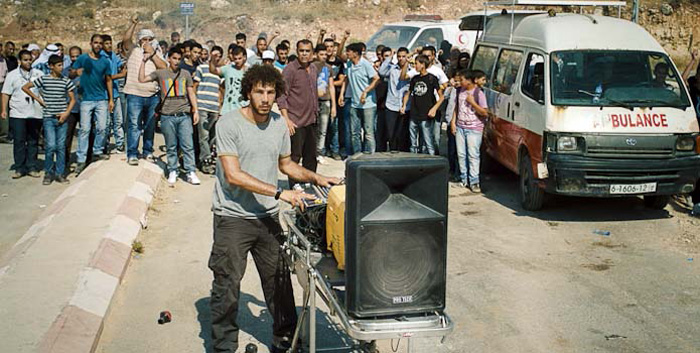No matter how much Stereo (Mahmud Abu-Jazi) loves his country, living in the warzone that is occupied Palestine has to prove hollow at some point. A wedding singer with what many say is a sweet voice—hence the nickname—that moment comes via an Israeli bombardment. The aftermath leaves his wife dead, his brother Sami (Salah Hannoun) a deaf mute, and himself ravaged by the guilt of not being there and the understanding that his government’s words are empty. With his nephew also in jail as a member of the resistance—and frankly better off than dead within days on the streets—his dream of a homeland has ended despite some still holding tight to hope. The only thing left now is to leave and Canada is as good a place as any to start anew.

The announcement of his escape from the painful memories sparks Sami’s interest to join him. A licensed electrical engineer, his handicap has made his ability to gain employment null. Hope still exists that Western medicine may help as the promise of a fresh start proves cathartic. He too lost a loved one during the bombing as his injuries and embarrassment forced him to cancel his wedding with the lovely Laila (Mayssa Abdel Hadi). Desperate to make him stand strong by her side and not let the occupation win by running away, she writes a note declaring her undying love that he avoids like the plague once he and Stereo leave Jenin for their sister Mariam’s (Areen Omari) place in Ramallah. Laila reminds him of a past self he can no longer be.
Before they’re allowed to emigrate, however, Stereo and Sami must put ten thousand dollars d in a bank account as a sort of collateral in case they are unable to find work straight away. Their brother-in-law Ziad (Assem Zoubi) works as their lawyer to put everything in place legally as they seek assistance from a friend (Mussam Abu Eishe) to rent sound equipment and book the odd job utilizing it. Stereo hasn’t sung anything since his wife’s death and therefore serves only as an engineer while Sami sets up the connections. They work weddings, memorials, and even government conferences wherein the local Minister (Walid Abdel Salam) regurgitates the same party line the Palestinians have heard for years with no traction. It’s a steady stream of futile events that only help reinforce Stereo’s decision to leave.

This is the central plot to Rashid Masharawi‘s Falastine Stereo [Palestine Stereo], a drama at its core with a bitingly ironic humor. Not only does Masharawi have Sami working with sound despite not being able to hear a lick of it, he also has the brothers transporting the equipment inside a retired ambulance. The latter proves funny when they roll up on a church to provide speakers for the band, but absolutely tragic when parking on a street where someone is in dire need of a hospital. It’s the perfect premise for us to witness what’s happening on the streets as we hear snippets of protestors chanting, watch as occupied forces throw tear gas and shoot into crowds, and see how patriotic these citizens are despite having no true country to fight for.
Unwittingly, Stereo and Sami find themselves on the frontlines despite trying to leave altogether, catching a bit of what their friend Samir (Khalifa Natour) says is still a possibility. To him confrontation is key towards giving Palestine back what it deserves and while Stereo disagrees thanks to the hardships he’s had to face, the singer ends up playing his part in the resistance unintentionally anyway. Whether what they see and hear will change their minds to stay and help their fallen comrades or simply bolster the idea they must leave sooner rather than later may never be answered, but the question does beg us to wonder when enough is enough either way. Can they stay when they might be dead tomorrow? Can they leave knowing they leave behind defenseless family and friends?

Sami and Laila’s relationship stands in for the war too through the process of her asking him to confront his fears and insecurities by not retreating just like Samir attempts to persuade Stereo. Their leaving isn’t something they’ve come to lightly, though, as Canada shines like an oasis to could help both become more than is possible in Palestine. While we may not know this at first, we will once Stereo explains the details of the bombardment during his Canadian consulate interview. At some point survival takes precedence over an affiliation to the place you were born. And to watch both men laugh at their passports in the knowledge that the first time they ever had one was so to leave and eventually renounce their citizenship is both funny and sad.
Abu-Jazi and Hannoun bring their characters to life with an emotional authenticity that resonates with humanity. However, Masharawi’s story unfortunately lacked meat for this American, with its central conceit being overly simplistic and its political details too far in the background for me to fully comprehend. The tonal shifting from serious to funny can also be odd due to circumstances often being too dramatic for the levity not to appear out-of-place. And while I enjoy an open-ended conclusion—especially one as powerfully poignant as this—the not knowing almost renders the journey meaningless since the ramifications of their decision affects so many. There is a real struggle for place, freedom, and identity at play wherein fighting the Israelis becomes just the tip of the iceberg. It’s easy for Americans to take such notions for granted.
Palestine Stereo played at the Toronto International Film Festival. One can click below for our complete coverage and see the trailer above.


